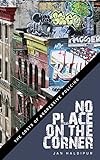No Place on the Corner : The Costs of Aggressive Policing / Jan Haldipur.
Material type: TextPublisher: New York, NY : New York University Press, [2018]Copyright date: ©2018Description: 1 online resource : 9 black and white illustrationsContent type:
TextPublisher: New York, NY : New York University Press, [2018]Copyright date: ©2018Description: 1 online resource : 9 black and white illustrationsContent type: - 9781479869084
- 9781479871407
- Citizenship -- New York (State) -- New York
- Community development -- New York (State) -- New York
- Crime prevention -- New York (State) -- New York
- Immigrants -- New York (State) -- New York -- Social conditions
- Police-community relations -- New York (State) -- New York
- Urban youth -- New York (State) -- New York -- Social conditions
- SOCIAL SCIENCE / Criminology
- Bronx ethnography
- Bronx
- Jeff Sessions
- New York City Housing Authority
- New York City
- New York Police Department
- achievers
- aggressive policing
- community policing
- community ties
- community
- consent decree
- criminal justice system
- district attorney
- ethnicity
- ethnography
- incarceration
- neighborhood policing
- neighborhood violence
- police
- public space
- second generation
- social capital
- stop and frisk
- witness testimony
- young adults
- 363.2/3097471 23
- HV8148.N5 .H353 2019
- online - DeGruyter
| Item type | Current library | Call number | URL | Status | Notes | Barcode | |
|---|---|---|---|---|---|---|---|
 eBook
eBook
|
Biblioteca "Angelicum" Pont. Univ. S.Tommaso d'Aquino Nuvola online | online - DeGruyter (Browse shelf(Opens below)) | Online access | Not for loan (Accesso limitato) | Accesso per gli utenti autorizzati / Access for authorized users | (dgr)9781479871407 |
Browsing Biblioteca "Angelicum" Pont. Univ. S.Tommaso d'Aquino shelves, Shelving location: Nuvola online Close shelf browser (Hides shelf browser)

|

|

|

|

|

|

|
||
| online - DeGruyter Race and the Politics of Deception : The Making of an American City / | online - DeGruyter Queer Nuns : Religion, Activism, and Serious Parody / | online - DeGruyter In Pursuit of Knowledge : Black Women and Educational Activism in Antebellum America / | online - DeGruyter No Place on the Corner : The Costs of Aggressive Policing / | online - DeGruyter The Art of Confession : The Performance of Self from Robert Lowell to Reality TV / | online - DeGruyter Struggling for Ordinary : Media and Transgender Belonging in Everyday Life / | online - DeGruyter Building a Better Chicago : Race and Community Resistance to Urban Redevelopment / |
restricted access online access with authorization star
http://purl.org/coar/access_right/c_16ec
Winner, 2019 Goddard Riverside Stephan Russo Book Prize for Social Justice, given by the Goddard Riverside Community CenterThe impact of stop-and-frisk policing on a South Bronx community What's it like to be stopped and frisked by the police while walking home from the supermarket with your young children? How does it feel to receive a phone call from your fourteen-year-old son who is in the back of a squad car because he laughed at a police officer? How does a young person of color cope with being frisked several times a week since the age of 15? These are just some of the stories in No Place on the Corner, which draws on three years of intensive ethnographic fieldwork in the South Bronx before and after the landmark 2013 Floyd v. City of New York decision that ruled that the NYPD's controversial "stop and frisk" policing methods were a violation of rights. Through riveting interviews and with a humane eye, Jan Haldipur shows how a community endured this aggressive policing regime. Though the police mostly targeted younger men of color, Haldipur focuses on how everyone in the neighborhood-mothers, fathers, grandparents, brothers and sisters, even the district attorney's office-was affected by this intense policing regime and thus shows how this South Bronx community as a whole experienced this collective form of punishment. One of Haldipur's key insights is to demonstrate how police patrols effectively cleared the streets of residents and made public spaces feel off-limits or inaccessible to the people who lived there. In this way community members lost the very 'street corner' culture that has been a hallmark of urban spaces. This profound social consequence of aggressive policing effectively keeps neighbors out of one another's lives and deeply hurts a community's sense of cohesion. No Place on the Corner makes it hard to ignore the widespread consequences of aggressive policing tactics in major cities across the United States.
Mode of access: Internet via World Wide Web.
In English.
Description based on online resource; title from PDF title page (publisher's Web site, viewed 01. Nov 2023)


